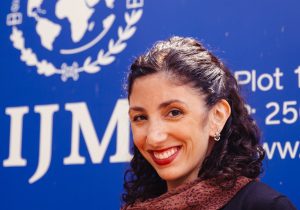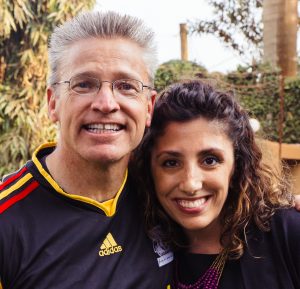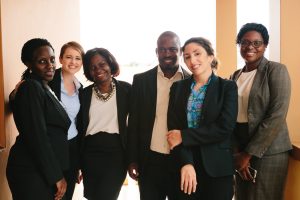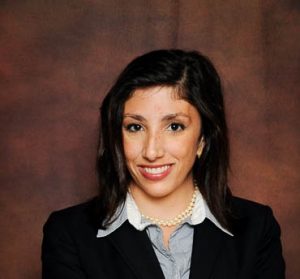Passion for compassion: Jessica Falkner J.D. ’14 helps victims of human trafficking and land grabbing in Uganda
By Brandi Palmer
In 2007, the U.S. Senate designated Jan. 11 as National Human Trafficking Awareness Day in the hopes of raising awareness to combat human trafficking.
Jessica Falkner J.D. ’14 is working as a legal fellow with the International Justice Mission in Kampala, Uganda, Africa, to help victims of the growing epidemic of land grabbing and other gender based crimes.
“Land grabbing occurs in developing areas when a husband or father dies and people within the community force the widow and children off their land,” Falkner explained.
The family members of the deceased, typically women and children, are often forced violently off their land and into homelessness, falling prey to exploitation and poverty which hurts communities and hinders economic development.
“Violence against the poor, whether it has arisen in a post-conflict vacuum or is more commonly the result of everyday violence, is the ultimate exploitation of vulnerability,” said Falkner.
Falkner explained that with two billion people living on two dollars a day and 115 million widows living in extreme poverty with a half billion children depending on them, there is a responsibility that comes with knowing the prevalence of violence against the poor.
“If we can’t protect the most vulnerable among us, both domestically and in an increasingly shrinking global community, we pay the irreparable consequences of indifference,“ said Falkner.
The Elon University undergraduate came to law school at Stetson with a desire to pursue public interest law with an international focus. She was compelled to work on global issues related to poverty.
At Stetson, Falkner found the strong international programs, quality of the faculty, and collaborative environment appealing.
“I knew Stetson was the right choice. It was a natural fit for me,” said Falkner.
“I was able to study public interest law in an international context through study abroad in Argentina and the Cayman Islands,” she said.
Looking back at her law school years, Falkner said she focused on the experiential education law school had to offer. In law school at Stetson, Falkner participated in a homeless advocacy internship through Equal Justice Works and legal aid pro bono work through Gulfcoast Legal Services that reinforced her interest in social justice. She took courses in public interest, human trafficking, international law and civil rights.
While at Stetson, Falkner was a student representative to the Tampa Bay Foreign Relations Committee. She spoke at the Immigration and Human Rights Symposium at Elon College of Law on the impact of a new family code in Morocco on women’s rights in the Middle East.
As a first-year law student at Stetson, Falkner lost her mother. It was at the reception following the her mother’s memorial that a family friend mentioned the International Justice Mission to Falkner for the first time.
After graduating with her law degree from Stetson, Falkner reached a crossroads where she was considering a traditional legal path or a different path more aligned with her interests in public service. She explained that she was volunteering, working with the International Federation of Human Rights, Pisgah Legal Services, and Mana Food Bank where she helped with legal translation, domestic violence intake and fundraising. She recalled the conversation years prior about the International Justice Mission.
“After learning more about the organization, I fell in love,” Falkner explained.
A former prosecutor for the Department of Justice, Gary Haugen, was moved to found the International Justice Mission after working as the officer in charge of the UN Tribunal on Rwanda investigations.
“He went on to form the organization with the mission of attacking everyday violence in the developing world,” Falkner explained.
The International Justice Mission is an organization with the goal of advocating and providing services for those who have been enslaved, imprisoned, beaten, sexually assaulted or deprived of their land.
“In order to carry out this goal, it is important to understand that four-billion people live outside the protection of the law,” Falkner said.
The International Justice Mission addresses everyday violence by rebuilding the rule of law in areas where it has been destroyed and replaced by the privatization of the law by security companies and alternative dispute resolution systems that exclude the poor, Falkner said.
Falkner interviewed for a competitive Field Office Legal Fellowship with the International Justice Mission that has ultimately taken her to Uganda. As a legal fellow, she is carrying out the preliminary intake for a case involving the assault of more than 100 displaced orphans from a local orphanage. This has included writing the Potential Offenses Memo describing why the legal department should take on the orphans’ case and what investigators need to focus on in their preliminary investigation. Additionally, Falkner researched Ugandan corporate law to decide if the International Justice Mission can represent an indigent orphanage and legally take on the case. Among other duties, she also interviews victims and local community leaders for impact statements for sentencing recommendations sent to the courts.
“It is clear that there is a lot to be done, and I am excited to see how my work unfolds during my time here in Uganda,” said Falkner.
No stranger to field work in foreign countries, as a young adult, Falkner was a rural community health volunteer with the Peace Corps stationed in southern Morocco for two years, where she worked in a small village a few hours north of the Western Sahara. She was an elected representative to the Peace Corps Morocco HIV/AIDS committee, where she developed curriculum and trained volunteers. She also helped improve health in the village by working with local leaders to tackle the need for a new sanitation system.
“We improved the existing system of a cart and donkey that collected trash occasionally through a grant process. The grant led to a more sophisticated system with a garbage truck, trashcans, and a landfill,” said Falkner. “The village pledged to pay for the sanitation workers’ salary and uniforms, and with the help of the grant money we were able to pull together the resources and training needed to create a modern sanitation system for the village’s garbage.”
Falkner’s interest in social justice began early.
“Growing up, compassion was a big part of my upbringing, “ said Falkner.
In high school, she explained that she volunteered with an organization called Wheeler Mission that provided the foundation for her interest in service work.
“Through these experiences and some time spent in underdeveloped areas, my heart for social justice began to really grow,” said Falkner. “This growing passion is also why I wanted to go to law school. I saw the law as a solution to some of the issues clogging social justice.”
Post date: Jan. 10, 2017
Media contact: Kate Bradshaw
[email protected] | 727-430-1580



